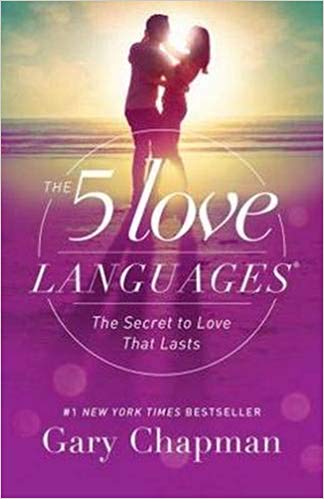
In the mid and late ’90s, a book sparked a new way of thinking about love. Love has been distinguished in it’s various forms, likely since humans fell for it, and notable as far back as the Greek Philosophy that identified Agape (the unconditional love one experiences with family), Eros (you can probably guess), Philia (friendship), Storge (empathy or loyalty one has for what they love), Philautia (love for self), and Xenia (hospitality and care found in generosity to others).
Now, that philosophy doesn’t lend itself in my mind well to exploring what Love might mean in a company. It was this book from when I was a kid, that was introduced to me recently, that put my outlook on work in a new light: How do we **feel** loved and appreciated? In and among a team of peers, among coworkers or cofounders, feeling appreciated is as valuable, if not more so, than compensation.
Dr. Gary Chapman authored The 5 Love Languages recognizing that, depending on our individual personality types, we may feel loved differently than those we love. His thesis? That understanding and decoding these different ways of showing love helps take some of the mystery (and frustration) out of everyone in relationships feeling loved.
Thus, given things like the Myers-Briggs personality types, the Entrepreneur personality types, and the work recruiters and executives do to match personalities to professional cultures and values, would the same not apply to team mates?
According to Dr. Chapman, there are five love languages: Words of Affirmation, Acts of Service, Receiving Gifts, Quality Time, and Physical Touch.
Article Highlights
The 5 Love Languages
- Words of Affirmation: verbal compliments; and in turn, how negative compliments more substantially harm the relationship than might be the case with others for whom words of affirmation are less meaningful.
- “You are fantastic, thank you for that!”
- Acts of Service: doing things without being asked. In particular of course, doing things for that person.
- Doing the dishes
- Receiving Gifts: providing those meaningful and thoughtful tokens that say something to the person, through what it is that they’re given.
- Picking up roses on the way home from work
- Quality Time: undivided attention: no movies, no video games, no kids, no smartphones. That is though, not necessarily that you’re NOT doing that if that’s what quality time means to you both but rather that it’s the purposeful time focused on one another.
- Date night
- Physical Touch: that hug. Whether holding hands or more, this is how love is experienced and appreciated.
Now, the trick is to either better understand the 1 or 2 that matter most to you (and communicate that) or at least prioritize about yourself the list and talk about it.
For example, having explored this a bit about myself, how I feel loved is by way of physical touch and quality time.
And that’s not just true my relationship with my wife. And that’s when it dawned on me that this language of love can really be an invaluable insight to every relationship. My family, my kids, and my wife, all know that what really matters to me is that we spend time together, and I vastly prefer it in person because that hug matters.
And what I’ve learned and we can all learn about me, from that, is also true; that I don’t really care or feel anything from gifts given to me, I don’t need people doing things for me, and I’m grateful for affirmations but that’s really all I feel from them (though truth be told, words of affirmation would certainly be #3 on my list).
And as I look at how I work, I see my preference for the same experiences. I don’t care for praise about what I’m doing, I favor investment and partnership over charity, and so too, doing things for me is nice but…
I greatly favor in-person meetings (I hate phone calls), I greatly appreciate focus and undivided attention in meetups, and everyone who knows me professionally knows I’m a hugger more than a handshaker.
What that reveals about the way I work is not that I expect everyone to do things the way I want, it’s that I feel more appreciated (loved) when people work with me that way.
In a Team
In MediaTech Ventures, we’ve evolved through being a couple of crazy people with an idea, to a startup with passionate founders and advisors, to company with the roles you’d expect.
How did these teams find one another and align over our passions for the work we’re doing?
Does our CTO prefer gifts or affirmations? Does the co-founder long for a hug? Would the intern prefer some quality time together or just a compliment?
Make no mistake, everyone has a difference balance of these signs of affection, with some appreciating only one to someone else really appreciating all of them. The magic isn’t as simple as your team sharing with you the one thing that matters most but rather, talking about them and really being attuned to what matters to people.
When teams struggle or when people move on from companies, it’s likely a result of THEIR preferences not being met. And indeed, in my personal life, I can appreciate how I feel less cared for if, over time, my loved ones are merely saying nice things about me or doing something for me, without just spending time with me and giving me a kiss on the forehead.
Between Company and Customers
What really struck me to write a thought about companies was, of course, the fact that it’s almost Valentine’s Day.
Seriously, no, it was actually not the team itself in a company but the time I’ve spent thinking about how this too applies to EXTERNAL business relationships: with customers, investors, and business partners.
Might our work and effort to start companies not benefit from a simple appreciation of what others appreciate most? Investor Relations is, after all, really just showing appreciation to those taking a risk on you.
Of course, in such relationships, parties are looking for the very unemotional and sterile ROI; they need their problems solved, the value in the business transaction, and the return on their investment of time or money. But as we explore Customer Service, retention, satisfaction, trust, Net Promoter Scores, and referrals, what it likely comes down to is the more emotional language of love.
Do your customers and investors feel appreciated in the way that matters to them?




Flashback had not heard anyone talk about that book in a long time. I really enjoy helping other people and spending quality time with quality people. Interesting topic.
This absolutely applies. You get to know how to truly reward your team and it’ll look different but feel equally as impactful. A word of praise and high five take the same effort but will mean something different to everyone.
You may be onto something. I’m also a physical touch and quality time guy and I loved my last job initially when my manager was single and would regularly go to company happy hours, we went to several shows together, etc., but after a year or so there, he got into a serious relationship and went into strictly business mode so all non-work interaction came to an abrupt end. The rest of my team members were extremely introverted and seemed mostly just there to do their work, collect their checks, and go home to their families. Once my manager joined their ranks, I slowly started enjoying working there less and had no choice but to follow suit. In hindsight, that was the beginning of the end as far as job satisfaction went. I stuck around for three more years, but those last three years definitely were more of a grind and much less conducive to my springing out of bed in the morning looking forward to going to work, since going to work meant going to sit in isolation among a sea of people.
Very true!!! Thank you for sharing
This absolutely has value in the workplace. That is also why I love teaching the B.A.N.K. methodology to business professionals as well – rather than love languages it is about communicating to the other persons VALUES and what is important to them. Super simple and HUGELY effective in the workplace!
BANK? Tell me more
It’s a very good book. Pair that with the four agreements and you’re set.
Brilliant! Thank you (ordered)
https://www.amazon.com/Four-Agreements-Practical-Personal-Freedom/dp/1878424319?fbclid=IwAR3Xl1q32Zt-owuROOtWiqRUdChU6YdpgKNWBhvfOMEU0sFeRaf-aIW5ZHI
He also wrote a version that is appropriate for office/work environments. The same useful dynamics apply (just better defined and aligned for work 🙂
This is interesting but I am not taking any money from any Investor that requires physical touch!
Right on!
While you hate phones, I always appreciated and valued our one on one calls 😉 I am coming for that hug someday though!
Count on it!
I did it with my leadership team and it was helpful especially around those who prefer focused attention over words of affirmation or prefer acts of service over gifts.
Having done all the things at work, I’m still a sucker for Meyers Briggs.
Thanks for always being open hearted and generous with your ideas, Paul O’Brien
Yah, they made a version of the book for work
https://www.amazon.com/Languages-Appreciation-Workplace-Organizations-Encouraging/dp/0802418406/
[thumbs up] to this thread. Being vulnerable at work has paid off in spades. This is also a helpful book:
Dare to Lead: Brave Work. Tough Conversations. Whole Hearts.
https://www.amazon.com/dp/0399592520/ref=cm_sw_r_cp_api_i_4YlpEbN1QQSFF
Paul, yes and thank you for leading out with this in business. In this context, love translates into acknowledgment, reward, validation, appreciation and promotion. When employers/colleagues recognize and utilize the “mother tongue” that lights each one of us up, that’s a force of incentive and purpose that will drive loyalty and delivery. People thrive where their language is recognized, valued and rewarded. Again, thank you.
… the harville hendrix IMAGO series on relationships is also pertinent to business.
this book is absolutely fantastic and transformational for all relationships
Cool concept. #vistage #austinceo #ceos #businessleaders #austinceos
Next time we meet, a hug. KOYA’s roadmap has a place in your profile to add your love language making it easier for friends to know how best to connect with you.
I hadn’t considered the potential overlap, what a thought-provoking post Paul!
Mine are a photo finish between Acts of Service & Physical Touch, and the former is very meaningful in both my Exec job and my business (someone doing a thing that helps move things forward is *SWOON* fodder), and I can definitely agree that hugs, high-fives, and fist-bumps are definitely something I could use more of in my job and potentially the business…
Highly recommended book for those of us in long-term relationships (She’s still married to me after 26 years!). FYI, there is a test at the end of the book. The results tell you what your most important love languages are specific to you.
Like you, Paul, I’m physical touch and quality time, followed closely by words of affirmation. My 1:1’s with my team and lunch with teammates are some of the most rewarding times in my week. And I ask if i can hug people because I know not everyone has the same comfort level. Hugs can get me through a tough day though!
Call me crazy, hugs should be as normal as handshakes 🙂